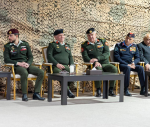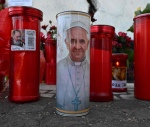You are here
King Abdullah’s stand against alternative homeland narrative for Palestinians
Sep 25,2024 - Last updated at Sep 25,2024
In a powerful address to the United Nations General Assembly during its 79th session, His Majesty King Abdullah reaffirmed his unwavering stance on one of the most contentious issues in the Middle East: The Palestinian-Israeli conflict. His message was resolute and clear — Jordan will not become an alternative homeland for Palestinians, and any forced displacement of Palestinians constitutes a war crime.
For years, extremists have propagated the dangerous narrative that Jordan could serve as a substitute state for Palestinians. This notion, championed by certain factions within Israeli politics and supported by far-right extremists, poses a grave threat not only to Jordan's stability but also to the prospects for a viable two-state solution. In his address, King Abdullah made it abundantly clear: “Let me be very, very clear—that will never happen.”
King Abdullah’s speech is rooted in a long legacy of Hashemite resistance to the idea of converting Jordan into an alternative Palestinian state. His father, the late King Hussein, faced similar pressures and firmly rejected such proposals. For Jordan, this issue is deeply intertwined with national identity. Any suggestion that jeopardises this delicate demographic balance threatens the Kingdom’s unity and sovereignty.
The King has consistently advocated for a two-state solution based on the 1967 borders, with East Jerusalem as the capital of an independent Palestinian state. This position aligns with longstanding international consensus and is viewed by Jordan as the only viable path to peace. The notion of an "alternative homeland" in Jordan undermines this vision and exacerbates an already volatile conflict.
In an era when global norms and international laws are increasingly ignored, King Abdullah’s words resonate with urgency.
He highlighted that “undermining our international institutions and global frameworks is one of the gravest threats to our global security today”. His remarks emphasised how Israel’s occupation and military operations have persisted in defiance of international law for decades. The impunity afforded to Israel, he contended, only encourages further violations and breeds extremism on all sides.
Jordan’s commitment to peace has been steadfast. The Arab Peace Initiative, which offers Israel full normalisation in exchange for a just resolution to the Palestinian cause, has been consistently rejected by successive Israeli governments. Instead, these administrations have opted to expand settlements, annex land and perpetrate violence against Palestinians. This ongoing impunity, King Abdullah warned, poses the greatest threat to Israel itself, undermining prospects for a peaceful resolution.
The King’s address illuminated the stark reality faced by Palestinians, particularly since October 7, 2023. The unprecedented scale of death and destruction in Gaza has elicited international condemnation, yet tangible action remains elusive. King Abdullah’s depiction of the Israeli assault, which has resulted in one of the highest child death rates and a shocking number of child amputees, should compel the global community to take decisive action.
He called for the establishment of an international protection mechanism for Palestinians to prevent further atrocities, urging the UN and the international community to uphold their responsibilities under international law and ensure accountability for Israel’s actions.
Jordan’s strategic position and its role as custodian of the holy sites in Jerusalem make it central to any resolution of the Palestinian-Israeli conflict. King Abdullah’s declaration that Jordan will never serve as an alternative homeland for Palestinians is not only a defence of national sovereignty, but also a clarion call for genuine justice for the Palestinian people. His stance serves as a reminder that solutions imposed on Jordan would destabilise the region and fail to address the core issues of occupation and displacement.
As King Abdullah concluded his speech, the message to the international community was clear: peace and justice cannot be achieved through the further marginalisation of Palestinians. The international community must act now, not only to protect Palestinian lives, but to ensure that the principles of equality, justice and human dignity remain at the heart of the global order. He emphasised that the solution to the conflict lies not in temporary ceasefires or fragmented interventions but in a decisive global stance against the prolonged occupation and systematic violations of Palestinian rights.
King Abdullah warned that continued inaction, or the misperception that this conflict could be managed rather than resolved, would lead to further regional instability, extremism, and humanitarian disaster. “The price of global indifference is paid in Palestinian lives, but the consequences will reverberate across borders and continents,” he cautioned, underscoring that the question of Palestine is not a distant issue but a core test of the international community’s commitment to universal human rights. By standing with Palestine, he argued, the world would be reaffirming its dedication to justice and peace not just in the Middle East, but for oppressed people everywhere.
King Abdullah urged world leaders to recognise that meaningful peace can only come through the restoration of Palestinian rights, the end of occupation and a sincere commitment to a two-state solution that grants Palestinians the dignity, security and sovereignty they deserve. “Without justice for Palestine, there can be no lasting peace in the Middle East or beyond.”
This was a direct call for international accountability and action, reminding the global community that real peace requires not just rhetoric, but concrete steps towards ending oppression and securing a fair, just resolution to the Palestinian-Israeli conflict.
King Abdullah’s words resonate beyond the walls of the General Assembly, echoing with all who strive for a just and lasting peace in the Middle East. It is imperative for the world to listen, for the cost of inaction is too great, and the stakes are undeniably high.













Add new comment